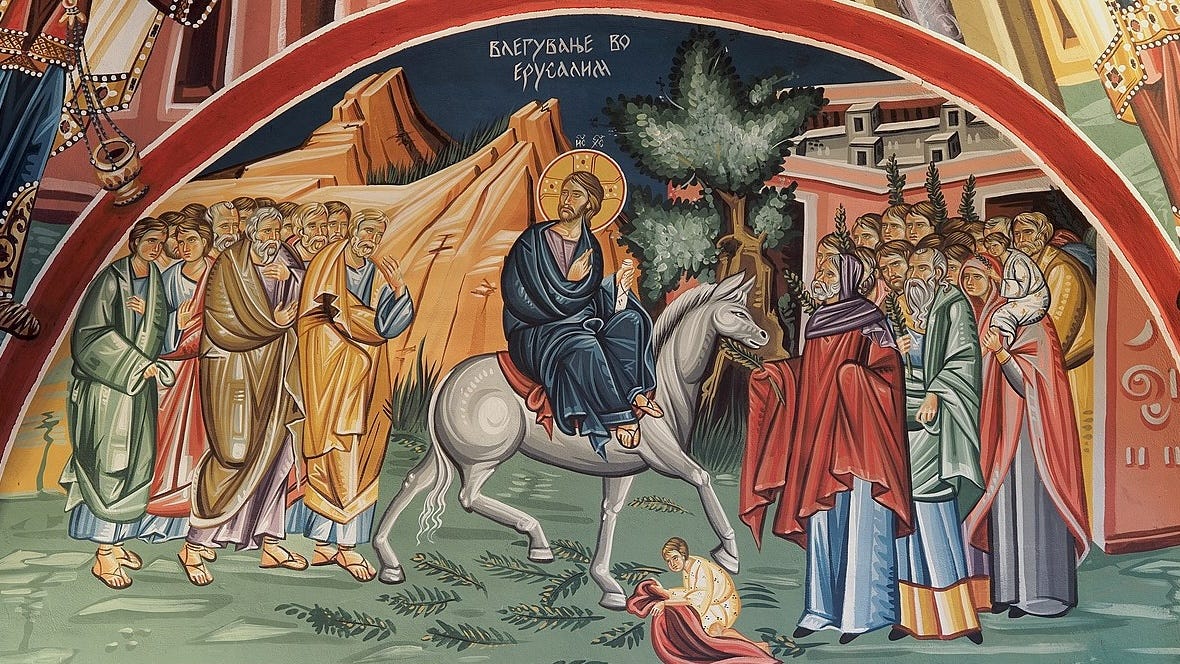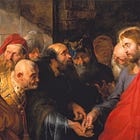Why did Christ say the stones would cry out?
Our Lord tells his enemies what happens when Man refuses to praise his Creator.

Our Lord tells his enemies what happens when Man refuses to praise his Creator.
Editor’s Notes
In this Part, Fr. Coleridge tells us…
How creation itself is ready to praise the Redeemer when man fails to speak.
That divine worship is not a matter of discretion but of cosmic necessity.
Why Christ receives imperfect praise rather than allow silence to dishonour His work.
He shows us that every voice must join in proclaiming redemption, or be judged for silence.
There is so much material that we could share during Holy Week. Rather than trying to provide it all, we will instead focus on how and why Christ’s triumphal entry into Jerusalem provides a key to the whole of his blessed and glorious Passion.
The Procession of Palms
Passiontide, Part I, Chapter II
St. Matt. xxi. 14-17; St. Mark xi. 1-11; St. Luke xix. 29-44; St. John xii. 12-18.
Story of the Gospels, § 132
Burns and Oates, London, 1889
Headings and some line breaks added.
Sung on Palm Sunday
Our Lord casts reserve aside and enters Jerusalem as Christ the King
What was it about Palm Sunday that most surprised the Pharisees?
‘The stones will cry out’
‘He said to them, I say to you, if these shall hold their peace, the stones will cry out!’
These words seem to imply that the occasion was one on which it was so becoming that God should be praised in some unusual way, that if those remained silent, for whose benefit such great mercies were vouchsafed, the inanimate creation itself would be fain to take voice, in order that the glories of God should not be unsung.
Man is the creature in the universe who alone, with the exception of the Angels, can give God intelligent praise, and this praise is a duty which he is bound to perform, because he has received the power of performing it. His mind and heart are given him for this purpose, that he may recognize his Maker’s claim, reading His wonderful works and giving thanks for them, in heart and in tongue.
It is the duty of the other creatures to render Him unintelligent praise, by obeying the laws of their being which He has given them, and taking each the part which belongs to it in the great symphony of the universe. Man alone below can rise to the intelligence of the works of God, and it is consequently a duty of his being to praise Him, and draw out that magnificent revelation of Himself which He has made in Creation and Providence.
But of all the great works and manifestations of Himself by God, there is none so worthy of eternal and immeasurable praise as that work of Redemption which was to be accomplished within the next few days in the Holy City.
How the words are fulfilled
When the first creation was wrought, as we are told in the Book of Job, ‘The morning stars sang together, and all the sons of God made a joyful melody.’1 On the present occasion, as the great counsel of Redemption was unfolded before the eyes of the blessed Angels, we cannot doubt that they burst forth into songs of joy and thanksgiving, which were not less magnificent and rapturous than those with which they had celebrated the physical creation.
When man had been created, it had been his first duty to re-echo on earth the praises of Heaven. And now that all Heaven was in a blaze of joy and wonder at the work of Redemption, it was not to be thought of that the voices of men on earth should not be lifted up, to take part in the celebration of mercies of which earth was the immediate scene and man the immediate recipient. In any case the debt of praise was to be paid, and the men who were being blamed for now paying it, in their poor way, were but discharging, however inadequately, what was the duty of the whole world.
Some holy writers say the words of our Lord had an actual fulfilment in the witness that was borne, a few days later than this, by the physical creation itself, to our Lord on the Cross. Then the voices of men were hushed in silence, but the sun and moon that withdrew their light, the earth that was shaken, the rocks that were rent and gave up their dead, the veil of the Temple that was torn from the top to the bottom, gave witness to the greatness of Him Who was dying on the Cross. This is a kind of fulfilment of the words before us.
They seem more naturally to mean that the people who were blamed for praising Him on this occasion were not doing anything that required reproof. Rather they were occupied in a duty that was so fitting and necessary at the time, that God would have had to work a miracle to supply their deficiency if they had not done it. Instead of an exaggeration of ill-timed praise which was not due, they were paying to their Lord and God a small and inadequate tribute of honour which the universe was bound to render Him then and there, and which it could not altogether omit without failing to discharge, in a way that was inconceivable, the end for which it was made.
Those few voices on the slopes of Mount Olivet ought to have been echoed from pole to pole, and from the rising of the sun unto the going down of the same. Instead of blame falling on them, the whole world was guilty for not joining them. God could not have allowed this in the creation which He had made, and so, if it had been possible that His Providence could have suffered them to be silent, He would have had to give voices to the stones themselves in order that His praises should not be unsung.
Our Lord’s own indignation
Thus the words of these Jewish cavillers at the simple enthusiasm of the disciples were met by our Lord in a manner which they could hardly have expected. Our Lord’s language implies indeed that He felt indignation as well as they did. But it was indignation at the silence of the synagogue and its rulers, the official mouthpieces of the praises and thanksgivings of the chosen people, a silence which now in the Providence of His Father had been in some measure compensated by that very tribute of homage and adoration on the part of the people of which they had complained.
He had now been so many years among them, in fulfilment of a long series of prophecies which ought to have prepared them for Him, as well as with a constant flow of miracles of mercy to point Him out as the Messenger of God, and what had they done to show Him honour?
It had been the same from the beginning, a long history of neglect, indifference, contempt, rejection, on the part of those who of all men were the most bound to be vigilant in discerning and eloquent in giving thanks for His long train of ineffable mercies and benefits. And God had continually provided those who might take their place in the discharge of the duties of which they were so neglectful.
At His entrance into the world the Shepherds of Bethlehem had been the chosen worshippers to honour Him, when the priests of His Temple knew nothing of His presence. The Wise Princes of the East, who had no part in the inheritance of Israel, came from afar to honour Him, while Jerusalem could tell them where He was to be born, but could not find time to see if His birth had taken place.
When He sent His messenger before His face to prepare His way by the preaching of penance, the leaders of the people turned away with coldness, and the poor multitudes, who felt their own need of remission, formed the bulk of those who welcomed him, as they were afterwards to form the bulk of those who welcomed our Lord Himself. The publicans and sinners heard both our Lord and St. John gladly, while the Scribes and Pharisees found fault with our Lord for receiving them with such condescension and affability.
So the history of the honour due to God had gone on—alas! it still goes on, and will till the end of time. The Gentiles take the place of the Jews, and nation after nation from among the still unconverted heathen has to be called into the fold, to take the place of those Christians who fall away therefrom, either because they will not believe what the Church teaches, or because they will not obey the Divine precept of unity.
The words that describe His reception at the first, are always true even unto the last ages of the world. He came unto His own, and His own received Him not. And then others are called in who are more humble and more docile, that the house of the great King may be filled with guests.
To these strangers from without He gives power that they may be made the sons of God, instead of those who had proved themselves ungrateful for their high vocation.
End of Part IV of our Passiontide and Holy Week focus on the Triumphal Entry.
In the next part, we see Christ lament over Jerusalem sealing its fate in its rejection of himself.
Subscribe to never miss an article:
The Procession of Palms
Our Lord casts reserve aside and enters Jerusalem as Christ the King
What was it about Palm Sunday that most surprised the Pharisees?
Read Next:
Here’s why you should subscribe to The Father Coleridge Reader and share with others:
Fr Coleridge provides solid explanations of the entirety of the Gospel
His work is full of doctrine and piety, and is highly credible
He gives a clear trajectory of the life of Christ, its drama and all its stages—increasing our appreciation and admiration for the God-Man.
If more Catholics knew about works like Coleridge’s, then other works based on sentimentality and dubious private revelations would be much less attractive.
But sourcing and curating the texts, cleaning up scans, and editing them for online reading is a labour of love, and takes a lot of time.
Will you lend us a hand and hit subscribe?
Follow our projects on Twitter, YouTube and Telegram:
Job xxxviii. 7.




